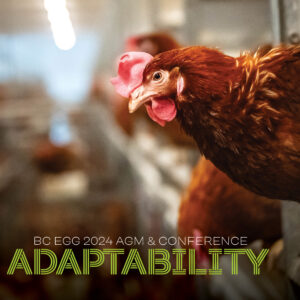Think Eggs
Eggnog Christmas Countdown
This year we’re celebrating the season with a collection of recipes showcasing our favourite holiday beverage: eggnog! We’ve got over…
Peter Clarke has been passionate about being an egg farmer since he was a kid. Growing up, he remembers conversations he had with his mother who tried to make him choose another path in life. But Peter had made his decision long ago.
“Farming is something that I had an interest in from a very young age, and just had a passion for wanting to be involved in,” said Clarke, a fifth-generation farmer. “I knew being a farmer wasn’t an easy life — but it was a really rewarding life.”
After he became a parent, he supported his son’s wish to be the sixth generation to farm their land on the Annapolis Valley in Nova Scotia, partly because egg farming in Canada now operates under a system that creates stability for both producers and consumers.
“My son very quickly recognized the stability of the industry. He recognized that we get our cost of production out of the marketplace and we are able to reinvest in our farms, so it actually became an opportunity that he wanted to be involved in,” explained Clarke, who is chairman of Eggs Farmers of Canada (EFC), an organization that represents more than 1,000 regulated egg farms across the country.
Eggs in Canada are produced under supply management, a system that matches production to the needs of the market and that provides clear safety and quality standards for how eggs should be farmed.
Supply management helps prevent surpluses or shortages of eggs. That gives farmers some protection against the ups and down of agriculture, and allows them to reinvest in technology and programs to stay current so they can continue to provide a safe product to consumers. In return, consumers get a product at a stable and fair price that is local, fresh and always of the highest quality.
The system also helps to maintain small, family-run farms which produce locally and pollute less. Egg farmers produce eggs that meet the highest standards of food quality and safety, of local production, to satisfy the needs of Canadians.
Bruce Muirhead, a professor with the University of Waterloo and EFC Public Policy Research Chair, said such strict guidelines, combined with the ability to trace the source of every single egg produced within the system, help make supply management a system consumers can rely on.
“All farmers understand the mechanisms needed to ensure food stability and safety, and the graders are also part of the system, so there’s a simple directive that comes out of Ottawa and they all implement it,” he said.
“Supply management stands on its own; it produces a really high-quality product at a fair price for consumers.”
While the value of supply management is generally understood by Canadians and government, as evidenced by the force with which Ottawa fought to maintain the current standard during this summer’s Trans-Pacific Partnership Agreement negotiations, there can at times be opposition to program.
“It would appear that over the past 40-odd years, the institution of supply management has provided an opportunity for stability in marketing of those commodities, and stabilized those industries,” explained Rick Holley, a food safety expert with the University of Manitoba.
“The downside of all of that, of course, is that while the Canadian government doesn’t subsidize the farmers directly, you and I as consumers do. There’s a trade-off.”
But Muirhead said that if egg prices didn’t take the cost of production into account, Canadian consumers would be paying for the difference through their taxes, like they do in the United States.
The latest farm bill passed in the U.S. in 2014 allowed for $1 trillion worth of subsidies over the next 10 years to subsidize the production of milk and eggs and turkey and chicken.
“If we want to compete with the U.S., we’re going to have to subsidize our farmers, too, if we adopt a different kind of model, which I don’t think there’s any appetite for at all in Canada,” Muirhead said.
Egg Farmers of Canada believe most consumers understand this, and are happy to support local farmers whenever possible.
According to their data, 90 per cent of Canadians trust the quality standards for food from Canadian farms, while up to 95 per cent say it’s important that the eggs they consume come from Canada.
That level of trust in the quality of a product “isn’t something that you can just sit back and rely on,” Clarke said, adding there’s a desire to not only maintain the trust but to improve upon it.
Egg farmers work with the Canadian Food inspection Agency, and have implemented a comprehensive on-farm food safety program called Start Clean Stay Clean™. The program includes everything from on-farm inspections, to mandated standards for storage, cleanliness, air quality, feed, record-keeping and more.
“That’s why we have such programs on our farms — to make sure that we’re not only providing a safe product to consumers, but that we have programs in place that actually help us achieve those goals,” Clarke concluded.
This story was produced by Postmedia Works on behalf of Egg Farmers of Canada for commercial purposes. Postmedia’s editorial departments had no involvement in the creation of this content.

This year we’re celebrating the season with a collection of recipes showcasing our favourite holiday beverage: eggnog! We’ve got over…

BC Egg is hosting our 2024 AGM and Conference at the Fairmont Hotel Vancouver. Will you be joining us?

Celebrate World Egg Day with eggs ANY time!